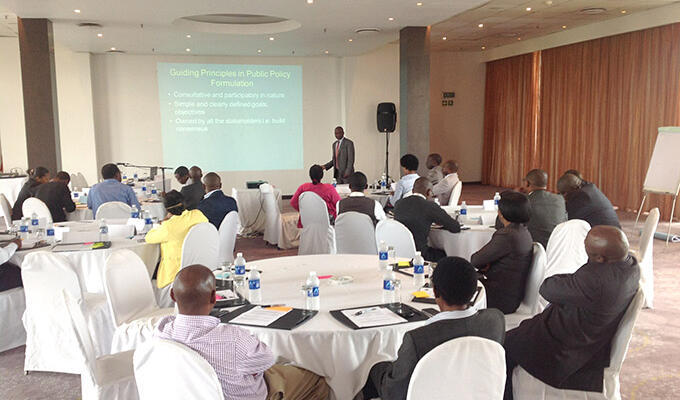


ITC Impact: TPO benchmarking (en)
Based on the dictum that what is not measured cannot easily be improved, ITC has for years been working with trade support institutions (TSIs) around the world to help them identify their strengths and weaknesses – and see how they match up against their peers.
This comprehensive benchmarking exercise assigns TSIs a score between zero and 100, based on some 225 performance indicators covering everything from their governance to the services they offer. It has helped agencies, especially trade promotion organizations (TPOs), to understand where they need to improve in order to meet global best practices.
Pamela Coke-Hamilton, executive director of the Caribbean Export Development Agency, has worked with five trade promotion organizations in the Caribbean region on the benchmarking exercise. ‘Not only has it assisted in the identification of areas of strength but also in pinpointing specific areas for improvement based on international best practices,’ she said.
In 2014, ITC took the benchmarking work to the next level. Under the ‘AIM for Results’ project, interested TSIs are building close, long-term relationships with ITC, aimed at embedding sustained, measurable improvements in their effectiveness at helping small and medium-sized enterprises (SMEs) in developing and transition economies to increase the value of their exports.
Finally, a ‘Measurement’ phase quantifies the success the changes have had in enhancing the organization’s capabilities. A key priority for this stage is ensuring that the organization shifts towards effectively measuring what is important not only to analyze results, but to help them continuously upgrade their services.
In short, AIM for Results helps TSIs understand their own managerial and operational performance, so they can achieve measurable improvements in their service delivery to clients, especially the SMEs that are aspiring to or beginning to connect to international value chains. 12 TSIs already implementing AIM for Results
By the end of 2014, twelve TSIs were implementing AIM for Results, in countries including Bangladesh, Benin, Burkina Faso, Cambodia, Mauritius (where two separate TSIs are participating), Morocco, Nicaragua, Saudi Arabia, Sri Lanka, Zambia and Zimbabwe. In addition, five Caribbean countries - Barbados, Belize, Dominican Republic, Jamaica and Trinidad and Tobago - had been benchmarked, in preparation for a Caribbean-focused AIM initiative. While they are all at different stages of implementation, a consistent priority has been to create greater awareness about the importance of using results and impact measurement to understand, improve and manage their respective performance.
Enterprise Mauritius, which had already made changes based on its 2012 benchmarking, was keen to take even bigger strides in improving its performance. In 2014, ITC worked with it to prepare a phased improvement roadmap. By year’s end, Enterprise Mauritius had completed a strategy development workshop and was honing its strategy. (Under the AIM process, TSIs write their own strategy documents, to ensure that they develop capacity for sustainable change; ITC helps facilitate strategy development.) Zambia’s trade promotion organization, which was benchmarked in 2014, is also working to prepare its new strategic plan.
The Caribbean Export Development Agency has been working with ITC to conduct benchmarking exercises with TPOs in the Caribbean Forum region. In 2014, Jamaica and Belize were benchmarked, bringing the number of Caribbean agencies that have been assessed to five. ‘The process of benchmarking and assessing five of CARIFORUM’s trade promotion organizations has been an important project for the Caribbean Export Development Agency,’ said the Caribbean trade and investment promotion agency’s Coke-Hamilton. ‘TPOs are an important partner for Caribbean Export and we are as committed as they are to bridging these gaps with new strategies which have been tried and tested at the international level.
Collaborating with ITC in this valuable exercise has laid the foundation to extend our partnership with TPOs, building their capacity to better serve the region’s private sector as we work together to maximize the region’s export performance.’
Nearby Nicaragua and Costa Rica were also benchmarked, with Costa Rica’s agency, PROCOMER, receiving some of the highest scores across all areas of operation. While PROCOMER’s scores make it a model for others around the globe, it is working to implement several of ITC’s recommendations to become even more effective. ‘We work very hard every day to improve our performance and the quality of services we provide our clients,’ said Jorge Sequeira, who was CEO of PROCOMER during part of the reform process. ’Exporting in a competitive, globalized economy is a challenging task, so they demand our best. ITC’s benchmark report is a powerful tool to help us determine we have advanced in the right direction
towards becoming a high-performance organization.’
When trade promotion organizations are more effective, it translates to greater exports, which tend to mean more and better quality jobs. At a time when governments everywhere are feeling fiscal pressure and looking to exports as a driver of growth, TSIs need to be able to do more with less, even as their SME clients’ needs grow more complex, amidst the emergence of new markets and private standards.
Over a five-year period, AIM for Results will assist some 50 TSIs to better serve the needs of their clients.




